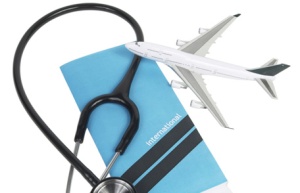Medical treatment abroad, also called ‘medical tourism’, is a booming international industry where patients seek healthcare from sources outside their country. Usually every type of medical treatment is available abroad with over 50 countries identifying as destinations in medical tourism. Increased familiarity with destination country protocols is necessary, and all potential risks should be taken into account before making a final decision to travel abroad.
Suppose you need surgery and cannot afford it. Or maybe you want to try an experimental treatment that is not available in the United States. You could be seeking cosmetic surgery, but find that the costs are too high. What are your options? A growing number of people in the United States are seeking medical treatment in unlikely places—overseas hospitals. Traveling internationally for medical care is often referred to as medical tourism. But, it may not be as carefree as your average vacation. If your vacation destination is a hospital rather than a hotel, you have a lot more to consider than your fellow vacationers do.
India, Thailand, and Malaysia are among the nations driving the medical tourism revolution. Medical tourism in India, which is considered the leading country promoting medical tourism, is growing nearly 30% annually. Indian medical corporations aggressively court American and western patients with package deals that include flights, hotels, treatments and postoperative recovery vacations. A low-cost gastric bypass in sunny Mexico, a tummy tuck in Brazil or fertility and cancer treatment in India—it’s all part of medical tourism, the umbrella term for traveling abroad to obtain inexpensive health care, for both medically necessary and cosmetic treatment. While the concept has been around for years, recent stories in the media have pointed out the risks involved, but medical tourism is an estimated $24-40 billon-dollar industry, says Patients Without Borders.
Medical risks
Medical tourism increases the risk of nosocomial infections, also referred to as healthcare or hospital acquired infections. For example, if needles are reused between patients or other unsafe injection practices are occurring, serious infections such as hepatitis and HIV can be transmitted. Patient autonomy and informed consent both represent a cornerstone of bioethics, which can sometimes mean a concerning issue for medical tourists. In the context of medical tourism, informed consent can be influenced by ambiguous or incomplete information on websites, problems in obtaining veracious information about success rates and the quality of care in destination facilities.
A British National Health Research Institute study published in February found many consumers who traveled for medical treatment were not informed about potentially serious risks. The study found most people rely on the Internet or friends rather than hard clinical findings. They had no idea about the risks, such as a lack of legal recourse and the costs of non-emergency care back home to fix problems that arose overseas. The U.S. Centers for Disease Control and Preventionexpress similar concerns and cautions about other potential problems. These include language barriers, unsafe needle reuse, substandard medication, greater bacteria presence and increased risk of post-surgical blood clots after a long flight.
